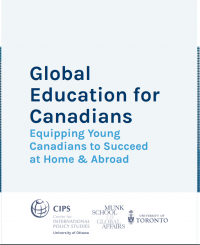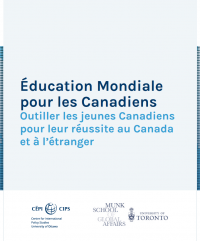The third wee
 k of November is International Education Week 2017. To mark the occasion, the WFCP will be sharing reports, opportunities, and highlights of the benefits of international co-operation and studying abroad during the week of November 13-17.
k of November is International Education Week 2017. To mark the occasion, the WFCP will be sharing reports, opportunities, and highlights of the benefits of international co-operation and studying abroad during the week of November 13-17.
In time for #IEW2017, University of Ottawa’s Centre for International Policy Studies and the University of Toronto’s Munk School of Global Affairs released a report on Canada and international education, Global Education for Canadians: Equipping Young Canadians to Succeed at Home & Abroad. The report concurs with studies that demonstrate a link between students who study abroad and further economic success, and looks at the benefits of students studying abroad to their home country, finding that students who study abroad also benefit their communities.
Study abroad is a great equalizer; the benefits associated with international education — namely higher academic scores, degree-completion rates, employment rates, and salaries upon graduation — are strongest among students from less-advantaged backgrounds. As the nature of work changes, automation, emerging markets, and global value chains will affect the type of skills that employers seek. The report also points to rising nativism around the world and the inoculation effects of studying abroad on intolerance.
The report compares Canada’s approach to international education to peer nations: Australia, European Union members, and the United States and makes policy recommendations for countries looking to adopt an ambitious international education strategy.
The report was informed by The Study Group on Global Education, a diverse group which included university and college presidents, private sector leaders, people with senior government experience, and individuals directly involved with students and outbound learning, drawn from across the country.